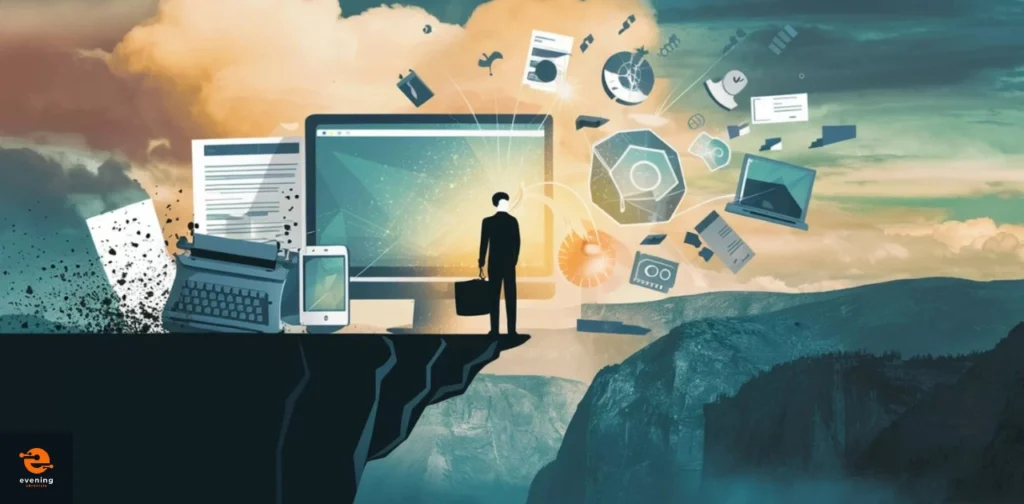Unveiling “lisakowww 4archive”: Digital Archives and Their Role in Information Preservation
The capacity to handle, store, and arrange enormous volumes of data has become critical in a time when digitalization is the norm. In order to preserve historical documents, protect the information, and guarantee that future generations may access knowledge, archives—especially digital ones—are essential. “lisakowww 4archive” is one such curious term that has been appearing in a number of online forums and debates. Even while it can initially appear to be a random sequence, it alludes to the more significant and crucial process of digital preservation.
The relevance of “lisakowww 4archive,” the function of digital archives, and the reasons they are important in today’s world will all be covered in this article. We will examine how technology, history, and information management are intertwined, as well as how resources and platforms such as “lisakowww 4archive” help preserve the most important material of the digital age.
Also Read: Fintech
What is “lisakowww 4archive”?
The meaning of “lisakowww 4archive” must be dissected before delving into its wider importance. The phrase first seems to be a mix of the number four, the term “archive,” and a personal name or handle, “lisakowww.”
“lisakowww”
“Lisakowww” could refer to an online persona or user handle. To identify distinct individuals or groups, many platforms—particularly those pertaining to file-sharing, archiving, or information retrieval—use particular usernames or tags. Thus, “lisakowww” could stand for someone or organization that specializes in organizing, disseminating, or archiving digital content.
“4archive”
The inclusion of “4archive” probably denotes a specific archiving-related goal or endeavor. This could be an online repository, a digital collection, or a technique for data organization and preservation. The “4” might represent the link to a particular collection or classification scheme in the larger context of digital archives. When combined, “lisakowww 4archive” may stand for an individual or group effort aimed at conserving online resources, such as media files, historical documents, or other digital assets.
The Evolution of Digital Archives: From Paper to Pixels
This section will explore the history of archiving, tracing the journey from traditional paper archives to modern digital systems. It will discuss how technological advancements in the late 20th and early 21st centuries revolutionized information storage. These advancements have made digital archiving a more efficient, accessible, and scalable solution. The shift from physical archives to digital formats has helped preserve an exponentially growing amount of information. This evolution has made it easier to store, access, and share knowledge on a global scale.
Digital Archives: The Backbone of Information Preservation
It’s crucial to first examine what digital archives are and why they are so vital in today’s society in order to comprehend the function of “lisakowww 4archive.” Digital archives are repositories that hold a variety of material, from documents and photos to websites and movies. Because they keep digital content organized, accessible, and saved for future use, these archives are an essential component of information management systems.
How “lisakowww 4archive” Helps in Combating Information Obsolescence

With the rapid pace of technological change, there is always a risk that older formats or data storage methods will become obsolete. This section will highlight how “lisakowww 4archive” addresses the challenge of information obsolescence by regularly updating its storage formats and ensuring that archived data remains compatible with new technologies. The article could discuss how the platform anticipates changes in data storage needs and adapts to ensure that stored content remains usable and accessible over the long term.
Each of these sections would provide a deeper understanding of the various aspects of digital archives and their significance in preserving information for the future.
1. The Growth of Digital Information
The amount of information being produced and disseminated in the digital age is astounding. Millions of people upload material to the internet every day, including multimedia files, news stories, academic papers, and posts on social media. It’s no easy task to maintain and manage this expanding corpus of knowledge. Important data might be permanently destroyed without digital archives, rendering it unavailable to future generations.
2. Historical and Cultural Preservation
Digital archives are valuable historical and cultural treasures that go beyond simple storage areas. They contribute to the documentation of our time’s events, ideals, and culture by keeping everything from official documents to firsthand accounts. Important historical records may be in danger of disappearing in the absence of strong archives. Digital archives make sure that society’s cultural landmarks are preserved, whether they are scientific studies, governmental documents, or the digital creations of artists.
3. Technological Advancements in Archiving
The quick development of technology has led to advancements in archiving techniques as well. Digital technologies that allow for faster retrieval and more effective organizing have replaced the traditional paper archives of the past. These days, archivists index and preserve digital content in safe, user-friendly formats using sophisticated software. The archiving process is now quicker and more dependable than ever thanks to technologies like automated backup systems, cloud storage, and metadata tagging.
The Importance of Digital Archives
Digital archives play an indispensable role in preserving information in the modern era. As the world becomes more digitized, much of the information we rely on is in digital form, from websites and blogs to research papers and photos. Without proper archiving systems, this wealth of knowledge could be lost due to data corruption, hardware failure, or even the simple passage of time.
Here are some of the primary benefits of digital archives:
1. Preserving Knowledge for Future Generations
The primary function of digital archives is to safeguard valuable information so that it is accessible in the future. Historical records, academic research, and even personal memories can be securely stored and accessed long after the original documents or websites are no longer available.
2. Access to Information
Digital archives democratize access to knowledge. Unlike physical archives, which are often limited by geography or the need for physical presence, digital archives make it possible for people all over the world to access preserved information with just a few clicks. This is particularly valuable for educational purposes, research, and cultural enrichment.
3. Protection Against Data Loss
One of the greatest advantages of digital archives is their ability to protect against data loss. Digital files can be easily backed up, ensuring that even in the event of a system failure or natural disaster, the data can be restored. This provides a level of protection that traditional, paper-based archives cannot match.
4. Ease of Search and Retrieval
A digital archive like “lisakowww 4archive” makes it simple to search through vast amounts of data quickly. With sophisticated search tools and indexing systems, users can find specific pieces of information within seconds, saving time and effort compared to searching through physical archives.
5. Cost Efficiency
Maintaining a physical archive can be costly, especially when considering the need for storage space, conservation efforts, and staff to manage the archive. Digital archives, however, can be maintained with a relatively lower cost, especially when leveraging cloud-based services.
The Role of “lisakowww 4archive” in the Digital Preservation Ecosystem
“Lisakowww 4archive” can be a special project or website that supports the larger trend of digital archiving. Although it’s unclear from the information provided what “lisakowww 4archive” actually means, it might be a project of a single person or an online community devoted to conserving and disseminating digital content.
1. Personal Archiving Initiatives
Curating and preserving content for private or public use is a task that many people and digital creators have taken on. Sites such as “lisakowww 4archive” could function as digital repositories devoted to particular types of material, such as multimedia files, blog entries, or digital artwork. These archives may be created by people who are passionate about preservation in order to guarantee that data is preserved and available even when websites close or technology advances.
2. Contributions to Open-Source Projects
“Lisakowww 4archive” might also be associated with open-source initiatives aimed at internet archiving. Anyone can help with the gathering, preservation, and accessibility of digital content through the practice of open-source archiving. Making material publicly available is a frequent objective among communities focused on digital archiving, particularly when it comes to historically significant or instructive content.
3. Collaboration with Larger Institutions
Digital archives frequently depend on partnerships with bigger organizations, such as libraries, museums, and universities. Through these collaborations, content that might otherwise be in danger of vanishing might be preserved. In cooperation with these organizations, “lisakowww 4archive” might serve as a digital repository that helps preserve and disseminate important information for educational objectives.
The Importance of Digital Archives in Modern Society

It is impossible to overestimate the importance of archiving as the digital era continues to change how we produce, distribute, and use information. There are various reasons why digital archives are essential.
1. Access to Information
A unified, easily accessible platform for retrieving crucial information is offered by digital archives. Having a trustworthy digital archive is crucial to preventing knowledge from being lost to time, whether it be for study, teaching, or personal curiosity.
2. Legal and Governmental Use
Digital archives are used by businesses and governments to preserve private legal and historical documents. Policy studies, legal investigations, and legislative reasons can all make use of these archives. From election history to statistics on climate change, archives provide proof and documentation for a variety of topics.
3. Preserving Knowledge for Future Generations
Digital archives will contribute to the preservation of knowledge in the future, just as physical archives have done for centuries. Knowledge developed now will be available to people decades or even centuries from now thanks to the capacity to archive digital files.
The Future of Digital Archives
As digital technology continues to evolve, the importance of digital archives will only grow. Advances in artificial intelligence (AI), machine learning, and data analytics will further enhance the capabilities of digital archives, making it easier to organize, search, and retrieve information. Furthermore, as data storage techniques improve, digital archives will continue to expand, allowing for the preservation of even more information over longer periods.
Conclusion about Unveiling “lisakowww 4archive”
Digital archives such as “lisakowww 4archive” are an essential part of today’s information preservation ecosystem. By offering secure, long-term storage solutions for various types of digital content, these platforms safeguard valuable data. This protection ensures that the data remains intact despite the challenges posed by time, technology, and circumstances. This helps safeguard it from the ravages of time, technology, and circumstance. The role of digital archives is crucial for preserving knowledge. They also enable future generations to access and learn from the past.
As we continue to move toward a fully digital world, the demand for robust digital archiving platforms will grow. These platforms must also be user-friendly to accommodate a wide range of users. Platforms like “lisakowww 4archive” are essential for ensuring security and accessibility. These systems ensure that information remains accessible, intact, and ready to serve future needs.
FAQs: Unveiling “lisakowww 4archive”
1. What is the main purpose of “lisakowww 4archive”?
The main purpose of “lisakowww 4archive” is to provide a digital platform for archiving and preserving web content and digital files. It ensures long-term access and protection against data loss.
2. How does “lisakowww 4archive” differ from traditional archives?
Unlike traditional archives, which require physical storage and are often hard to access, “lisakowww 4archive” offers a digital solution. It is easily accessible, searchable, and secure.
3. Why are digital archives important for future generations?
Digital archives preserve valuable information that could otherwise be lost. This ensures that future generations will be able to access historical, cultural, and academic data.
4. Can personal data be stored in digital archives?
Yes, digital archives can securely store personal data. However, it is essential for the archive to have robust security measures to protect sensitive information.
5. How does metadata enhance the functionality of digital archives?
Metadata allows users to search and retrieve archived content. It categorizes and tags documents with relevant information such as author, date, or keywords.

